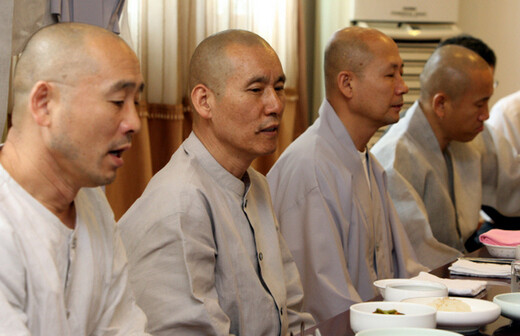hankyoreh
Links to other country sites 다른 나라 사이트 링크
Buddhists set to protest against Lee’s religious bias

Anger on the part of the country’s Buddhists over the lack of balance in the Lee Myung-bak administration’s approach to religion is becoming the biggest issue on the political landscape.
After finding his approval ratings in the teens, Lee was just beginning to reap the benefits of the U.S. Board on Geographic Names’ decision to reinstate its designations for Dokdo and Korea’s performance at the Beijing Olympics. Now he has been blind-sided by this issue.
The country’s Buddhist community is planning a large-scale protest for 2 p.m. on August 27 in Seoul Plaza under the title “Buddhist Believers Assembly Denouncing the Lee Myung-bak Administration’s Destruction of the Constitution and Religious Discrimination.” Buddhist leaders say they intend to put all the resources available to them into making it a big event and temples around the country have been told to encourage their members to participate.
Ven. Jigwan, the head of the Jogye Order of Korean Buddhism, the largest Buddhist denomination in Korea is also getting directly involved in the effort to mobilize monks and believers, publicly calling on them to come to Seoul.
Protest organizer Ven. Wonhak, a senior member of the Jogye Order, said at a press conference August 21 that he expects to see at least 20,000 Buddhists participate, including 10,000 monks. The event, then, could be larger than any other held beyond the regular confines of temple grounds, other than the street parade held yearly on Buddha’s birthday.
Unlike the country’s Protestants, who tend to be relatively dynamic in terms of character, the Buddhist community tends to be quiet and maintains their presence more in the mountains than in downtown urban areas, so the protest becomes a political event just for happening. Officials with the Jogye Order, the country’s largest Buddhist denomination, say the fact it is happening is evidence of how angry Korean Buddhists have become.
Specifically, Buddhist leaders cite how, while he was mayor of Seoul, President Lee offered the city to God in a public prayer, issued a statement on a video offering salutations to people participating in a prayer meeting in Busan at which participants prayed for the physical collapse of the country’s temples, and declared that the reconstruction of Cheonggyecheon was evidence of “God leading history.” These officials say they do not expect him to do the same in his role as president. Many Buddhists feel betrayed because they supported him in the presidential election.
Regionally, Buddhism is strongest in the Gyeongsang provinces, which, for the most part, happen to overlap with the area that has traditionally supported the ruling Grand National Party. Many Buddhist GNP supporters in North and South Gyeongsang Province voted for Lee despite their religious differences. They voted a Protestant elder into office, and now say they fail to see a president who transcends religion and serves the country as a whole.
With 11 million believers, Buddhism is Korea’s largest religion, but Buddhists have accounted for only 7.7 percent of Lee’s Cabinet appointments, 12.5 percent of his appointments to senior presidential secretary, and 4.8 percent of his other Blue House secretaries. Meanwhile, in the view of Buddhists, members of Lee’s Somang Church look like they have taken up all the important positions in government.
Furthermore the Buddhist community says Lee’s religious discrimination has reached dangerous proportions, so much in fact that it could cause national chaos.
“Most of the killing in the world originates in religious conflict,” said one monk. “The administration’s behavior could cause religious conflict.”
Jogye Order spokesperson Ven. Seungwon said that while he “hears the administration is working to correct the religious discrimination,” it “only gets worse.”
“The protests will spread to the provinces until the president promises to prevent future discrimination and carries out that promise,” said Ven. Seungwon.
The ball, as it were, is in the Lee administration’s court.
Please direct questions or comments to [englishhani@hani.co.kr]
Editorial・opinion
![[Column] Park Geun-hye déjà vu in Yoon Suk-yeol [Column] Park Geun-hye déjà vu in Yoon Suk-yeol](https://flexible.img.hani.co.kr/flexible/normal/500/300/imgdb/original/2024/0424/651713945113788.jpg) [Column] Park Geun-hye déjà vu in Yoon Suk-yeol
[Column] Park Geun-hye déjà vu in Yoon Suk-yeol![[Editorial] New weight of N. Korea’s nuclear threats makes dialogue all the more urgent [Editorial] New weight of N. Korea’s nuclear threats makes dialogue all the more urgent](https://flexible.img.hani.co.kr/flexible/normal/500/300/imgdb/original/2024/0424/7317139454662664.jpg) [Editorial] New weight of N. Korea’s nuclear threats makes dialogue all the more urgent
[Editorial] New weight of N. Korea’s nuclear threats makes dialogue all the more urgent- [Guest essay] The real reason Korea’s new right wants to dub Rhee a founding father
- [Column] ‘Choson’: Is it time we start referring to N. Korea in its own terms?
- [Editorial] Japan’s rewriting of history with Korea has gone too far
- [Column] The president’s questionable capacity for dialogue
- [Column] Are chaebol firms just pizza pies for families to divvy up as they please?
- [Column] Has Korea, too, crossed the Rubicon on China?
- [Correspondent’s column] In Japan’s alliance with US, echoes of its past alliances with UK
- [Editorial] Does Yoon think the Korean public is wrong?
Most viewed articles
- 1[Guest essay] The real reason Korea’s new right wants to dub Rhee a founding father
- 2Why Korea shouldn’t welcome Japan’s newly beefed up defense cooperation with US
- 3[Column] ‘Choson’: Is it time we start referring to N. Korea in its own terms?
- 4New AI-based translation tools make their way into everyday life in Korea
- 5[Column] Park Geun-hye déjà vu in Yoon Suk-yeol
- 6Senior doctors cut hours, prepare to resign as government refuses to scrap medical reform plan
- 7Opposition calls Yoon’s chief of staff appointment a ‘slap in the face’
- 8Will NewJeans end up collateral damage in internal feud at K-pop juggernaut Hybe?
- 9Terry Anderson, AP reporter who informed world of massacre in Gwangju, dies at 76
- 10Thursday to mark start of resignations by senior doctors amid standoff with government